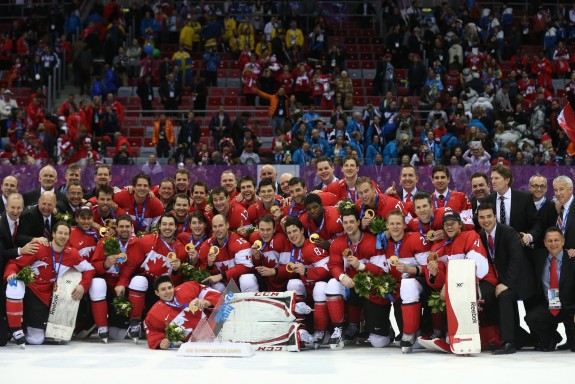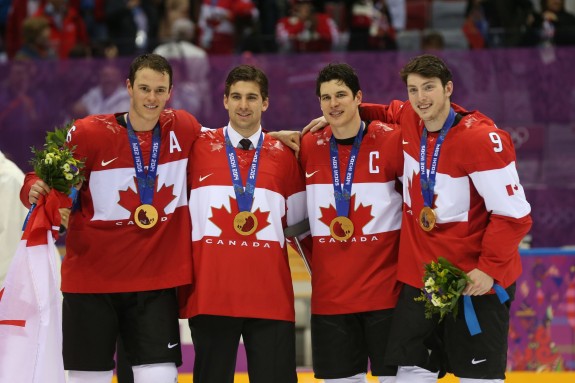
Team Canada was under heavy scrutiny in the months and years leading up to the 2014 Sochi Olympics. Many fans and analysts questioned whether the goaltending would be good enough to win gold. At the summer orientation camp there were jokes made regarding the ball hockey and walk-throughs the players were doing under head coach Mike Babcock. And of course, the roster decisions. Why Chris Kuntiz? Why not Claude Giroux? And on and on.
In 2010 Steve Yzerman and his staff were under tremendous pressure to put together a team that would win gold on home ice in Vancouver. They did just that and silenced the critics in the process. They’ve won gold again in Sochi, but in a different way. This team was a truly dominant force defensively.
Carey Price
Can Carey Price win big games? Can he hold up under pressure? These are questions that no longer need to be asked. Price looked confident. He was rarely caught out of position and did a good job limiting rebounds. Five starts, five wins and just three goals against. He shutout two of the best teams in the tournament — Sweden and the U.S. — in back-to-back games. Price finished with a .971 save percentage and a 0.59 goals-against average. Somehow Henrik Lundqvist managed to get on to the tournament all-star team over Price. The Swedish netminder was great, but Price was nearly unbeatable.
Olympic all-star team selections (only one Canadian):
Henrik Lundqvist
Erik Karlsson
Drew Doughty
Teemu Selanne
Phil Kessel
Mikael Granlund— James Mirtle (@mirtle) February 23, 2014
Team Defence
Price’s job was made easier by impeccable defending by both the blueliners and forwards. Led by Shea Weber and Duncan Keith, the three pairs of defencemen worked to keep the opposing forwards on the outside and takeaway the shooting lanes. The forwards backchecked and made smart plays in the neutral zone to disrupt the other team’s breakout. And, as a result, Canada won the puck possession battle. The defence hurried the puck up ice every chance they got by using the boards, making a quick stretch pass or carrying it themselves.
Early in the tournament the defence, particularly Weber and Drew Doughty, accounted for more than half of the team’s goals. This led to questions about chemistry and the ability of the forwards to produce. It was assumed offense would be the one area where Canada couldn’t falter. Even when news broke that Steven Stamkos wouldn’t play, Canada still had a number of healthy stars who were on fire heading into the tournament. Sidney Crosby, John Tavares, Ryan Getzlaf and Corey Perry included. Those four combined for just one goal in the round robin, but that wasn’t a fair representation of their performance.
The forwards were asked to play roles that they probably weren’t accustomed to playing in the NHL. While Babcock shuffled lines looking for the perfect combinations, one thing remained consistent: each line played responsible defensively. It didn’t matter that at the end of the tournament Canada ranked eighth in scoring efficiency or sixth on the power play, scoring on just 16.67 percent of their opportunities. They generated chances off the cycle, maintained good pressure and forchecked well. They just didn’t rack up a ton of goals. But, they scored enough to win.
Is this the best defensive team Canada has ever iced? "I believe so," says Steve Yzerman.
— Pierre LeBrun (@PierreVLeBrun) February 23, 2014
Sidney Crosby and Chris Kunitz in particular were under a ton of pressure. Crosby because he’s the best player in the world and Kunitz because it appeared as though he made the team for one reason and one reason only: to help Crosby produce offensively. Again, the top line was effective, but just couldn’t find the back of the net. Kunitz entered the gold medal game with Sweden having missed on a couple of wide open chances. He was playing well at times, but his stats were below average. He had zero points, just seven shots and was one of the only players on the team (along with PK Subban) with a plus/minus rating below +1.

Then, on the biggest stage, with Canada up 2-0 in the third period of the gold medal game, Kunitz scored on a beautiful wrist shot that went over Lundqvist’s shoulder, off the crossbar and in. With Crosby having scored on a breakaway after making a great defensive play and Jonathan Toews opening the scoring in the first, the questions were answered and the critics were quiet. It was the first goal of the tournament for each player and they couldn’t have come at a better time.
Team Canada may not have won the way it was expected to, but there is no question this was a dominant performance. Over six games Canada scored 17 goals and allowed just three. And, this is the first time a team has gone undefeated in the Olympics since NHL players starting participating in 1998.
Mike Babcock and the coaching staff never wavered, they stuck with the plan. And no, Steve Yzerman may not have selected the team you wanted, but you can’t question it now. Canada is golden, again.